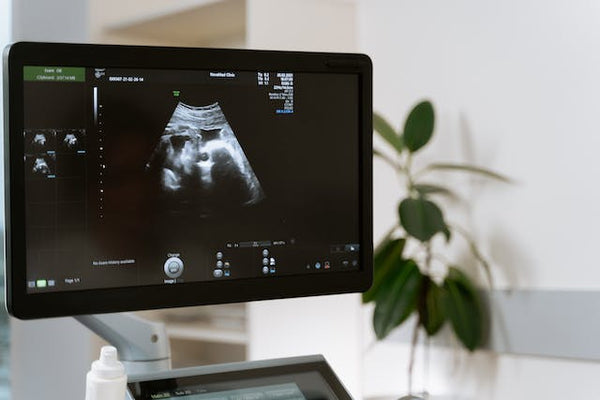Are Ultrasounds Safe for Babies? What Parents Need to Know

Updated 27 Dec 2024
Expectant parents often anticipate undergoing at least one ultrasound during their prenatal care. Despite its standard practice, some may harbor concerns about the safety of ultrasounds for their developing babies, especially when multiple scans are involved. Questions may arise regarding the safety of different types of ultrasounds.
Fortunately, ultrasounds are widely regarded as safe, carrying minimal risks. Moreover, according to the American College of Obstetricians and Gynecologists (ACOG), these imaging procedures play crucial roles in pregnancy, contributing to both monitoring and positive outcomes. Let's take a closer look at the reasons behind using ultrasounds in pregnancy and address any safety considerations.
What Is an Ultrasound?
An ultrasound, also known as a sonogram, employs high-frequency sound waves to create real-time images inside the body without using ionizing radiation, like X-rays. During the procedure, a gel is applied to the body, and a transducer emits sound waves, capturing echoes to generate images of organs, tissues, bones, and blood vessels.
In pregnancy, two main types of ultrasounds are utilized: transvaginal, with the transducer inserted into the vaginal canal, and abdominal, with the transducer on the abdomen. Transvaginal ultrasounds are common early in pregnancy, while abdominal ultrasounds are typically used in mid-to-late pregnancy.

Why Are Ultrasounds Performed During Pregnancy?
Ultrasounds serve various purposes during pregnancy, depending on the stage. In early pregnancy, a transvaginal ultrasound may ensure proper fetal development and viability, detecting conditions like ectopic pregnancy to prevent complications.
Around 20 weeks, a mid-pregnancy ultrasound, often termed an "anatomy scan," examines fetal development and checks for birth defects. This scan also assesses placental location, crucial for planning safe delivery and addressing issues like placenta covering the cervix, which may necessitate alternative delivery methods such as a cesarean section.

What Are the Benefits and Risks of an Ultrasound During Pregnancy?
Ultrasounds offer crucial insights into your baby's growth and development, providing detailed images of the uterus and baby. They help healthcare providers in evaluating well-being, anatomy, and placental health. While they are routinely conducted for dating, assessing fetal anatomy, and monitoring growth/placental health in high-risk pregnancies, ultrasounds also serve additional purposes, according to the ACOG. They can be used to measure amniotic fluid volume and determine the number of fetuses.
Are ultrasounds safe for the baby?
With a history spanning decades, ultrasounds boast a solid safety record, backed by over 30 years of data confirming their harmlessness to babies. Expectant parents can rest assured about the safety of their baby during ultrasound procedures. According to ACOG, there is no evidence indicating safety concerns for developing fetuses, and no known links exist between fetal ultrasounds and childhood cancer, birth defects, or developmental issues. While ACOG emphasizes the current safety, they recommend prudent use, only when medically necessary and under the guidance of trained healthcare providers, acknowledging the theoretical potential for future discoveries.
Are frequent ultrasounds safe for baby?
The US Food and Drug Administration (FDA) also acknowledges the benefits of ultrasounds in pregnancy when medically necessary. However, they caution against overuse, emphasizing that potential risks increase with unnecessary prolonged exposure or when administered by unqualified technicians. While ultrasounds are generally low-risk, their usage should be limited to situations where they are deemed necessary.
Are 3D ultrasounds safe for baby?
Although there's no credible evidence supporting harm from ultrasounds, caution is advised against non-medical use. Most medical professionals recommend avoiding procedures like "keepsake ultrasounds," including 3D or 4D scans for personal viewing. ACOG cautions that casual, non-medical ultrasounds pose risks of misinformation, offering false reassurance or misdiagnosis. The FDA aligns with this caution, advising against unnecessary ultrasound exposure through "keepsake" images or videos.
What Should I Look For in an Ultrasound Report?
While most pregnancy ultrasounds yield reassuring results, there are instances where concerns may arise, detecting conditions like birth defects, placental issues, or growth issues in the baby. It's crucial for expectant parents to maintain perspective, as not all unexpected findings are necessarily serious. Doctors may identify incidental issues that often turn out to be insignificant. Despite low risks, thorough attention is given to ensure safety and identify any significant concerns.
In the rare event of concerning results, rest assured that your medical team prioritizes your well-being and will take appropriate actions. You’ll be informed promptly about any major concerns and guided through the next steps. If necessary, you’ll receive specialized care from a qualified physician, such as a maternal fetal medicine provider for high-risk pregnancies.
The Takeaway on Ultrasound Safety
Ultrasounds are deemed safe and offer vital medical insights into your baby's development during pregnancy. That said, it's perfectly normal to have questions and concerns. If you're uncertain about any aspects of ultrasounds or have specific queries regarding their use in your pregnancy, don't hesitate to contact your OB/GYN, midwife, or healthcare provider for clarification.
Disclaimer: The information on our site is NOT medical advice for any specific person or condition. It is only meant as general information. Please contact your health provider if you have any medical questions or concerns about your child or yourself.









